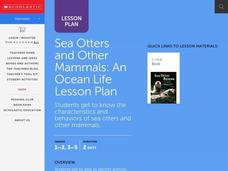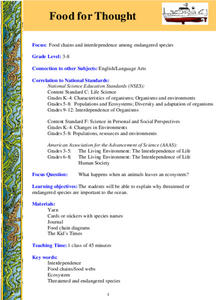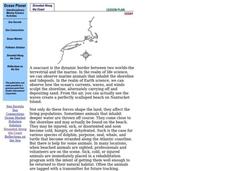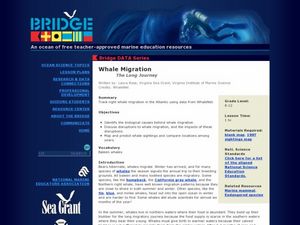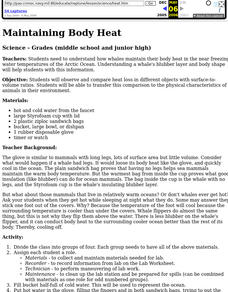Curated OER
Ocean Life
Young scholars identify marine mammals according to specific characteristics. Students read about marine mammals and list their characteristics. Next, young scholars play a Whale and Otter game on the playground to simulate whales...
Curated OER
Staying Up
Students will explain the Archimedes's Principle. In this lesson on plankton, students will describe three factors that can affect the buoyancy of plankton. This lesson contains extensive background information, extensions, and multiple...
Curated OER
Out of the Deep
Students observe, describe, and record characteristics of ocean animals (mammals and fish) and sea shells. They conduct an experiment comparing and contrasting sugar water, salt water and fresh water and create a mural of coral reef...
Curated OER
Food for Thought
Students explore the food chains in a variety of ecosystems and its relationship to the survival of threatened or endangered marine animals or fish in the ocean. The interdependence of the species is investigated in this lesson.
Curated OER
Whale Adaptations
Students explore whales and how they have adapted to survive in the ocean. For this whale adaptations lesson students complete several activities that allow them to investigate animal adaptations.
Curated OER
Predator/Prey Activity: Fish Feeding, Environments, and General Behavior
Students explore concepts of environment and survival among different marine life, focusing on the ocean environment.
Curated OER
Great Blobs of Jelly!
Students explain how zoo-plankton have an impact on the global process. In this ocean zoo-plankton activity students calculate carbon flux and plankton densities.
Aquarium of the Pacific
Turn a Cow into a Whale
Third graders explore animals that might have a common ancestor and resemble one another. For this cow and whale instructional activity, 3rd graders recognize the similarities between the whale and the cow. Students complete worksheets...
Curated OER
Gray Whales on the Move
Young scholars study whale migration and their natural history. In this migration lesson students plot whale migration on a map and describe their ecosystems.
Curated OER
Get Out in the Field
Students visit a shoreline--of an ocean, a lake, a pond, a riverbank, etc., survey it and record what they find there. They map the shoreline and surrounding area and conclude where potential waterfront projects could occur.
Curated OER
Stranded Along The Coast
Students reflect and investigate how a seacoast is the dynamic border between two worlds-the terrestrial and the marine. In the realm of life science, we can observe marine animals that inhabit the shoreline and tidepools. In the realm...
Discovery Education
Sonar & Echolocation
A well-designed, comprehensive, and attractive slide show supports direct instruction on how sonar and echolocation work. Contained within the slides are links to interactive websites and instructions for using apps on a mobile device to...
Curated OER
Who Would Win? Killer Whale vs. Great White Shark Storia Teaching Guide
Teacher guides are wonderful tools with tons of ideas that help you relate content in many different ways. Using the high-interest book, Who Would Win? Killer Whale vs. Great White Shark, learners hone their discussion and reading...
Curated OER
Caught in a Net
Students read and discuss the bycatch of the sea and the economic impact of taking bycatch away. In this bycatch lesson plan, students discuss the rights of fisherman and observe pictures of sea animals.
Curated OER
How Deep Do They Dive
Young scholars calculate and graph the diving depths of various types of whales. They cut out and glue whale pictures on a worksheet to represent the diving depths for five whales, and discuss how people use graphs to communicate.
Curated OER
Whale Migration - The Long Journey
Marine biology learners examine right whale sighting data from the WhaleNet website. They plot the data on a map and write down the number of adults and calves spotted. Questions accompany the data analysis activity, making this a...
Curated OER
An Imaginary Creature And Then Using Describing And Action Words for a Creative Writing Exercise
You have to collect lots of materials (boxes, bags, toilet paper rolls, etc.) for this lesson to work successfully. After modeling how to create an imaginary creature out of the collection of recycled materials, let your class search...
Curated OER
SPLASH – Monitoring Humpback Whales
Middle schoolers view a video about the humpback whale and why it is endangered. In this endangered species lesson, students recognize the importance of observing and following an endangered species in an ecosystem. Middle schoolers...
Curated OER
Busy Otters
Students prepare for a trip to an aquarium by identifying otters, their body parts and behaviors as they read "Pup's Supper", do an otter pantomime and make a puppet. After their field trip, they complete a Venn Diagram of Otter behaviors.
Curated OER
The Future of Arctic Sea Ice
Students research about the importance of sea ice to world climate and sea organisms. In this earth science lesson, students create a model of present and future Arctic sea ice communities. They discuss how ice melting affects...
Curated OER
Whale Blubber
Students examine the purpose and characteristics of whale blubber. They work together to complete an experiment to test the fat as an insulator. They discover how humans use materials to protect them from the cold.
Curated OER
The Gray Whale Obstacle Course Viewing Guide
Young scholars complete a worksheet while watching a film about whales. They examine the human impact on whale migration and identify adaptations the whale has acquired in able to survive. They discover how global warming has effected...
Curated OER
Oil Spill Cleanup
Learners participate in an oil spill simulation and how to clean it up. In this oil spill lesson plan, students also calculate the cost of the clean up of an oil spill.
Curated OER
Maintaining Body Heat
Students observe and compare heat loss in different objects with surface-to-volume ratios. They transfer this comparison to the physical characteristics of animals in their environment. They focus on how whales maintain their body heat.


